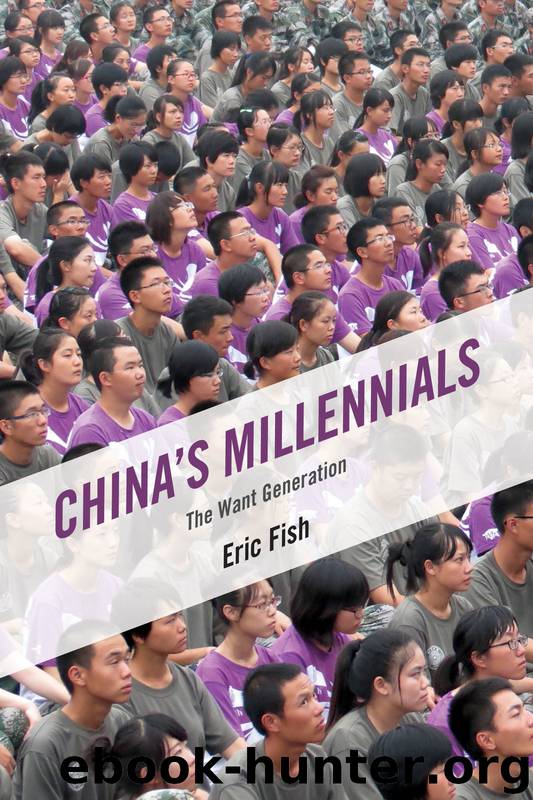China's Millennials: The Want Generation by Eric Fish

Author:Eric Fish [Fish, Eric]
Language: eng
Format: epub
Tags: Social Science, Asia, General, China, Ethnic Studies, History, undefined
ISBN: 9781442248847
Google: uqfOCQAAQBAJ
Publisher: Rowman & Littlefield
Published: 2015-06-04T20:43:20+00:00
Professor Steven White, who teaches aspiring young businesspeople at Tsinghua University’s Department of Innovation, Entrepreneurship and Strategy, said that China’s administrative weaknesses are just one of many factors hindering the innovative drive of young Chinese. He explained that his students consistently approach class activities, such as simulated negotiations, with an “eat or be eaten” mentality. They refuse to give up any information for fear of making themselves vulnerable, and they show little or no guilt about having to cheat to get ahead. White’s real-world observations have shown the same tendencies; he noted that cheaters have a sense of shame only if they get caught. “There are also elements of cohesion and loyalty, but that’s the exception here,” White said. “The rule seems to be you get ahead, and using others is part of getting ahead. It’s very antithetical. Innovation emerges from trust-based collaboration.”[12]
White tells his students a simple story to illustrate the widespread fear of thinking outside the box and challenging authority. In the story, a shopkeeper tells his two assistants to complete a task in a way that they both know will not work. One assistant adjusts the instructions and succeeds, while the other follows orders precisely and fails. The shopkeeper berates the one who failed and commends the one who succeeded, but later quietly fires the latter for not directly obeying orders.
“You can see that kind of obedience to authority [in China]; even when you shouldn’t,” White said. “It really goes through their heads. You never come up with your own ideas, and if your boss asks you to, it’s a trap. I can’t really say what I think the best idea is unless I know that’s exactly what my boss wants.”
This pattern of thinking in China likely stretches back far before Communism. With an enormous population and limited resources, the country has always been a scarcity society. Competition over resources has frequently been a life-or-death struggle, making misplaced trust or unnecessary risk potentially catastrophic. Couple this social culture with a political environment hostile to risk taking and innovative endeavors, and you have a difficult combination to overcome.
A 2013 survey of engineering students at top universities in the United States and China sought to compare attitudes toward startups among young would-be innovators in the two countries. It found that most students in both nations were interested in starting their own company. However, only 3 percent of the Chinese respondents actually planned to do so, compared to 22 percent in the United States. On the flip side, 52 percent of the Chinese wanted to work in government, compared to just 5 percent of Americans.[13]
The uninviting atmosphere for innovation has led to what even Chinese state media have dubbed the world’s worst “brain drain.” According to government figures, of the 2.64 million Chinese who left the country to study abroad between 1978 and 2012, only 41 percent returned.[14]
Factors contributing to the brain drain are numerous, ranging from environmental issues to educational opportunities. There also tend to be better facilities and support circles for research in the West.
Download
This site does not store any files on its server. We only index and link to content provided by other sites. Please contact the content providers to delete copyright contents if any and email us, we'll remove relevant links or contents immediately.
| Africa | Americas |
| Arctic & Antarctica | Asia |
| Australia & Oceania | Europe |
| Middle East | Russia |
| United States | World |
| Ancient Civilizations | Military |
| Historical Study & Educational Resources |
The Sympathizer by Viet Thanh Nguyen(4387)
The Rape of Nanking by Iris Chang(4209)
World without end by Ken Follett(3476)
Ants Among Elephants by Sujatha Gidla(3463)
Blood and Sand by Alex Von Tunzelmann(3201)
Japanese Design by Patricia J. Graham(3168)
The Queen of Nothing by Holly Black(2588)
City of Djinns: a year in Delhi by William Dalrymple(2555)
Foreign Devils on the Silk Road: The Search for the Lost Treasures of Central Asia by Peter Hopkirk(2463)
India's Ancient Past by R.S. Sharma(2451)
Inglorious Empire by Shashi Tharoor(2437)
Tokyo by Rob Goss(2428)
In Order to Live: A North Korean Girl's Journey to Freedom by Yeonmi Park(2390)
Tokyo Geek's Guide: Manga, Anime, Gaming, Cosplay, Toys, Idols & More - The Ultimate Guide to Japan's Otaku Culture by Simone Gianni(2372)
India's biggest cover-up by Dhar Anuj(2352)
The Great Game: On Secret Service in High Asia by Peter Hopkirk(2345)
Goodbye Madame Butterfly(2251)
Batik by Rudolf Smend(2179)
Living Silence in Burma by Christina Fink(2069)
